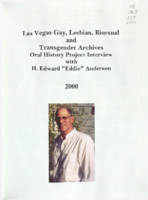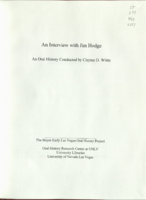Search the Special Collections and Archives Portal
Search Results

Sam Diaz interview, January 3, 2020: transcript
Date
Archival Collection
Description
Interviewed by Elsa Lopez. Sam Diaz was born in Los Angeles California, but was raised in Chula Vista, California. He is a police officer with the Las Vegas Metropolitan Police Department and has worked for LVMPD since 2007. He has served in in the U.S. Air Force Reserves since 2008, and served in the U.S. Air Force from 2001 to 2007. Diaz describes his multi-cultural upbringing and growing up in such close proximity to the U.S.-Mexico border. He describes his passion for serving which he had since a young age. He describes his incorporation within every community he has been a part of and talks about the ways he has worked to serve the Las Vegas community since moving here in 2007. He recounts the tragic night of 1 October, the mass shooting that occurred during the Route 91 Harvest music festival on October 1st, 2017 on the Las Vegas Strip. He talks about the various changes that happened within LVMPD since 1 October, and changes that he has seen in the Latinx community throughout the Las Vegas Valley. Diaz also describes the process of adopting two children and raising a multi-racial family with his wife in Las Vegas.
Text

Irene Cepeda interview, April 24, 2019: transcript
Date
Description
Interviewed by Monserrath Hernández, Nathalie Martinez and Rodrigo Vázquez. Irene Cepeda is a woman dedicated to serving the Latinx as well as all minority groups in education in Southern Nevada. As a Las Vegas native, she grew up alongside the Latinx community here and is a proud Latina from Nicaraguan roots. She is dedicated to uplifting the Latinx community through her work with the Latino Youth Leadership Conference and college access specialist at Nevada State College. Now, as representative of District D on the Clark County School District Board of Trustees, she seeks to tackle the issues the district faces from acts of White supremacy to a lack of funding for English Language Learner families.
Text

Mario C. Monaco interview, March 12, 1981: transcript
Date
Archival Collection
Description
On March 12, 1981, Kim Rhodes interviewed Mario C. Monaco (born in Italy) about his life as an educator in Las Vegas, Nevada. During the interview, Monaco speaks about his various teaching positions, how he ended up in Las Vegas, the changes seen in the Clark County School District and how it compares to educational districts throughout the nation. Moreover, Monaco discusses wages and teacher education opportunities, sports and extracurricular activities in school, community involvement, and racial integration through busing. Lastly, Monaco talks about his appointment to Director of Vocational Education in the Clark County School Districts, the programs offered by the vocational center in the valley and the importance of education.
Text
Jimmy Gay oral history interview: audio clip
Date
Archival Collection
Description
Jimmy Gay discusses racism in Las Vegas before and after World War II. He says that prior to WWII, there wasn't a lot of prejudice, and there were only a few African American families. After WWII, he says that the influx of soldiers returning and the migration of Black families from the South led to Las Vegas becoming the "Mississippi of the West."
Sound
Mabel and David Hoggard oral history interview: audio clip
Date
Archival Collection
Description
Mabel Hoggard discusses how she came to live in Las Vegas and her employment history. She was on her way to Los Angeles and stopped in Las Vegas to visit relatives in 1944. She was offered a job as a secretary at the USO (United Service Organizations) and her relatives persuaded her to stay and live in Las Vegas with them instead of moving to California like she had planned. After working for the USO from 1944 to 1946 she applied to be a teacher. She had been a teacher before but lost her job because she refused to contribute part of her salary to a campaign fund. She faced some racially-based opposition when she first started teaching in Las Vegas but Maude Frazier advocated for her and the members of the school board renewed her contract after her first year, and she said she didn't "have any trouble" after that first year.
Sound

Transcript of interview with Edward "Eddie" Anderson by Dennis McBride, October 11-14, 2000
Date
Archival Collection
Description
Dennis McBride interviews Eddie Anderson (born 1946) about his role in advocating for LGBT rights, specifically his participation in the various political and social movements during previous decades. The interview begins with a discussion of Anderson’s background, including his experiences growing up in children’s homes and living with his grandparents. Anderson mentions marching with his grandparents for both workers’ and women’s rights as some of his first political involvements. Anderson also discusses his original aspirations for becoming a priest as well as his memories of meeting President John F. Kennedy during a visit to his high school when Anderson was student body president. Anderson then discusses travelling to the South, specifically in Selma, Alabama, during one summer while in high school in order to help register Black voters. Anderson then discusses his friendship with Nevada Senator Bill Raggio and his wife, and his joining of the U.S. Navy, where he met President Ri
Text

Ron Current interview, March 16, 2012: transcript
Date
Archival Collection
Description
Ron Current's heart was always in the right place, with respect to social activism and his dedication to empowering the black community in Las Vegas. Inspired by Black Panther Party founders, Huey P. Newton and Bobby Seale, Ron started the Black Panther Party Las Vegas Chapter. He was also the director of public relations for the National Alliance Against Racist and Political Repression; an organization created to work in tandem with the National Association for the Advancement of Colored People, NAACP, to eliminate racial inequality. Ron describes the overall atmosphere of the Westside community in Las Vegas during the early days, as chaotic, drug infested, and riddled with daily gang related shootings. He also recalls the historic preservation attempts made by leading members of the Westside community, such as Sarann Knight Preddy. Ron recalls working at the University Medical Center while recruiting for the Black Panther Party Las Vegas Chapter. This interview demonstrates the power of love. As the founder and leader of the Black Panther Party Las Vegas Chapter, Ron was named one of the most influential blacks in Las Vegas by the Sentinel Voice. He recalls utilizing his hands-on leadership approach towards capacity building and the successful implementation of community mobilization strategies and methods. He was a champion for educational equity, equal access to employment opportunities, and economic equality in Las Vegas, Nevada.
Text
Transcript of interview with Count Guido Roberto Deiro by David G. Schwartz, January 30, 2002
Date
Archival Collection
Description
Count Guido Roberto Deiro, born in Reno, Nevada, in 1938, has had several fascinating careers. The son of vaudeville performer and recording star Count Guido Pietro Deiro, who was the first major piano-accordionist to become popular in the United States, and his teenage wife Yvonne Teresa LeBaron De Forrest, Deiro grew up in and around Las Vegas and Southern California after his parents' 1941 divorce. After attending 13 grammar schools and five high schools, Deiro graduated from Las Vegas High School in 1955. During his youth, thanks to his stepfather Samuel "Baby Shoes" Prezant, Deiro had an early introduction to the Las Vegas gambling scene. Following a brief stint in the U.S. Army, Deiro worked a series of jobs, including parking cars, selling shoes, and driving an ambulance. He transitioned from working as a fitness instructor to being a lifeguard at the El Rancho Vegas hotel, all the while becoming interested in aviation. Deiro entered the gaming industry at the age of 19 and a half, when he began working as a dealer, having been taught by his stepfather. Breaking in at the Nevada Club, Deiro, who became known as "Bobby Blue Eyes," later worked at the New Frontier, Sands, El Cortez, and Holiday casinos. He provides a great deal of detail about the social world of Las Vegas casinos in the 1950s through the 1970s, with insight into many major personalities. While working in gaming, Deiro continued to pursue a career in aviation, acquiring in the early 1960s a commercial pilot license, instrument rating and instructor's certificate. He began working as a flight instructor and charter pilot at Thunderbird Field, now known as North Las Vegas Air Terminal. Deiro flew around the United States promoting Las Vegas and the airfield. After Howard Hughes purchased the airfield in 1967, Deiro stayed, ultimately becoming Director of Aviation Facilities for the Hughes Tool Company. Following his marriage to Joan Marlene Calhoun, Deiro moved to California, where he became Vice President and Director of Administration for Air California and Golden West Airlines, before serving with other companies owned by C. Arnholdt Smith. In 1971, Deiro returned to Las Vegas. Deiro then met artist Michael Heizer, who enlisted Deiro's help in scouting and securing locations for his Earth art installations. This led to Deiro's long involvement with that genre. In addition to these careers, Deiro was also influential in many key developments in Las Vegas, including the construction of the Las Vegas Motor Speedway and, with his wife Joan, several philanthropic endeavors. In this interview, Deiro shares his perspectives on his times and his impact on Las Vegas.
Text

Transcript of interview with Dorothy George by Claytee White, October 13, 2003
Date
Archival Collection
Description
After serving as a nurse in World War II in Hawaii, Okinawa and Japan, Dorothy returned home to Chippewa Falls, Wisconsin. She experienced a particularly bad winter and she set out for California but stopped in Las Vegas to visit the family of her traveling companion, a girlfriend from her home town. The girlfriend returned to Wisconsin and George applied for a nursing license and got it within three days. She never left. Dorothy met her husband while working the night shift at Clark County Hospital. He would come in regularly to assist his patients in the births of their babies. Their occupations and their service in World War II drew them together in a marriage that has lasted over fifty years. From 1949 to this interview in 2003, Dorothy George has seen Las Vegas grow from a town that she loved to a metropolitan area that is no longer as friendly. She reminisces about the Heldorado parades, family picnics at Mount Charleston, watching the cloud formed by the atomic bomb tests, raising six successful children, leading a Girl Scout Troop, and working in organizations to improve the social and civic life of Las Vegas.
Text

Transcript of interview with Jim Hodge by Claytee White, April 13, 2009
Date
Archival Collection
Description
Jim Hodge describes an active and success filled life in this narrative. Born and raised in the South, Jim enlisted in the Navy at the young age of 17, just as World War II was winding down. His primary job was that of a cook. He became smitten with the life of an entertainer after participating in a play and headed for Hollywood in 1952. It was there that he auditioned for Donn Arden, who organized and directed Las Vegas shows. Though he didn't get the part, he did get hired to be a singer for a show featuring Betty Grable. Thus his career was launched and would span the heyday of Las Vegas entertainment from the 1950s to the 1970s. Jim talks about the people, shows and places that touched his life. He also offers thoughts about the changes in the Vegas entertainment scene as well as shares his relationship with his church over the past 40 years.
Text
